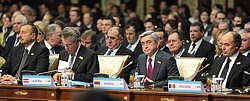As it was expected, closer to the launch of the summit in Astana new realities popped out regarding the NKR conflict resolution. The presidents of Armenia and Azerbaijan promised “more decisive efforts” to resolve the Nagorno-Karabakh conflict but announced no concrete peace agreement. They only issued a joint statement that was also signed by the heads of the U.S., Russian and French delegations Russian President Dmitry Medvedev, US Secretary of State Hillary Clinton and the foreign affairs minister of France François Fillon at the summit. It said Presidents Serzh Sargsyan and Ilham Aliyev “reaffirmed their commitment” to seek a peaceful settlement based on international law and “basic principles” advocated by the three mediating powers. According to the statement, the signatories “agreed that the time has come for more decisive efforts to resolve the Nagorno-Karabakh conflict.” “They further agreed that a peaceful, negotiated settlement will bring stability and security and is the only way to bring real reconciliation to the peoples of the region,” it said. The statement added that the mediators urged Aliyev and Sargsyan to “focus with renewed energy on the issues that still remain in the Basic Principles” and instructed U.S., Russian and French diplomats co-chairing the OSCE Minsk Group to “continue to work with the parties to the conflict to assist in these efforts.” “We must also renew our efforts toward a settlement in Nagorno-Karabakh based on basic principles elaborated under the auspices of the Minsk Group,” Secretary of State Hillary Clinton, who heads the U.S. delegation at the two-day summit, said in separate remarks. In yesterday’s statement the leaders of the 5 states recalled the joint statements of the leaders of Armenia, Azerbaijan and Russia on October 27, 2008 in Moscow and November 2, 2010 in Astrakhan. This kind of statement of this format was heard for the first time. Besides that, the leaders of the two countries are agreeing with the so-called Madrid Principles and the evidence of that is the high-level interest of the leaders of super powers to regulate the conflict soon. So it seems that the deadline for regulating the conflict is running out and the terms for a status quo are worn out, which is naturally going to be negatively admitted by the OSCE co-chair states. According to preliminary information the president of Azerbaijan has at the last moment refused to meet with the Armenian president, who after the release of this statement has made a pretty rough statement as always addressing new accusations to Armenia. Indeed, it is not excluded that in fact the meeting didn’t take place because of other reasons. One thing is clear for sure. Since yesterday the NKR conflict has moved to a field of “decisive efforts.” Moreover, the impression is that a little depends on Armenia and Azerbaijan and the co-chairing states will only try to distribute evenly the technical matters of pressure on the conflicts sides.

